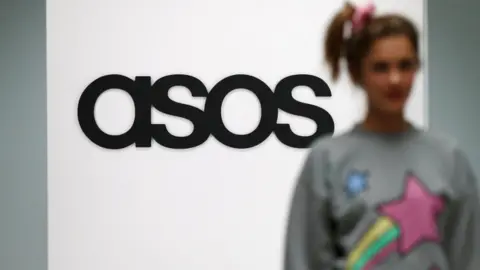Half of fast fashion made of new plastics, finds report
 BBC
BBCNearly half of of women's clothes for sale on some of the leading online websites are made entirely from new plastics, according to a study.
The research by the charity the Royal Society for the Arts (RSA) looked at 10,000 items being sold by Boohoo, Prettylittlething, Missguided and Asos.
It found on average 49% were made of polyester, acrylic, nylon and elastane.
The RSA said the numbers varied by outlet with Asos using comparatively less new plastic than the others.
The study found that 60% of Boohoo's women's clothing and 57% of Boohoo-owned Prettylittlething's were made entirely from new plastics.
Missguided had 42% of its items made entirely from new plastics and Asos 36%.
The RSA also said that the study found that on average, just 3% of clothes which contained any plastics used recycled plastics - "although this rises to 6% among items from Asos".
Missguided's head of sourcing and product technology Paul Smith said the company was "proud of the progress it had made" and that all its own brand products were packaged and despatched in 100% recycled plastic. However, it added: "We agree there's more to do."
The company said it had "committed to making sure 10% of our products will use recycled fibres by the end of 2021 and 25% by the end of 2022".
Asos said the figures reflected positively on it, but like the rest of the industry it recognised more needed to be done.
The study for the report Fast Fashion's Plastic Problem, was carried out between 11 and 29 May. The researchers looked at more than 2,500 recently added items from each website, spread across different product categories.
'Throwaway culture'
The RSA said the plastic used large amounts of energy and created environmental damage in their production and could take thousands of years to break down.
It added that a "throwaway culture", meant that "the bulk of these garments are ending up in landfill".
"The sheer volume of clothing produced by these websites is shocking - we should see many of these items, which go for rock-bottom prices, as akin to other short-lived plastics. The nature of fast fashion trends means they are not designed to have long lives in our wardrobes," said the report's co-author Josie Warden.
The RSA is calling for action to cut down on the use of plastic in fashion items.
It wants to government to look at introducing a plastics tax on clothes imported into or produced in the UK.
It says websites should come up with ways of promoting second-hand clothing, "along the lines of Depop and Asos' marketplace" and to publish figures on how much plastic they use.
And it is encouraging consumers to buy less and keep clothes for longer, rather than only wearing garments a "handful of times".
 Reuters
ReutersAsos, said its prices were not at "throwaway" levels and disputed the report's description of it as a fast-fashion retailer.
It pointed out it does publish information about fabrics and their care, including on a new page on its website about how to care for clothes in a more environmentally-friendly way.
It said it is encouraging that the RSA figures reflected positively on it because shifting to more sustainable materials was a key element of its Fashion With Integrity programme.
However, it said like the rest of the industry it recognised there was much more work to do and that it was continually reviewing and developing programmes to minimise its impact on people and the planet.
'Mountain to climb'
Boohoo has published its Up Front strategy which sets an "ambitious" goal of all polyester and cotton being recycled or more sustainable for 2025.
However, the RSA report said the company had a "mountain to climb" to meet this target.
Boohoo said: "Solutions to these complex challenges require collaboration which is why we are delighted with the response from our existing and new suppliers to help us identify innovative solutions to achieve this target," a spokesperson said.
Boohoo is a member of the Sustainable Apparel Coalition and a signatory of Textiles 2030.
"We've engaged with our customers extensively through focus groups and a recent survey, that received over 14,500 responses, to understand their attitudes to textile waste," the spokesperson added.
"What they tell us is that the price they pay does not determine how long they keep an item of clothing and 88% said that they use either charity shops or resale sites as a responsible form of disposal, throwing an item away is an absolute last resort for them."
